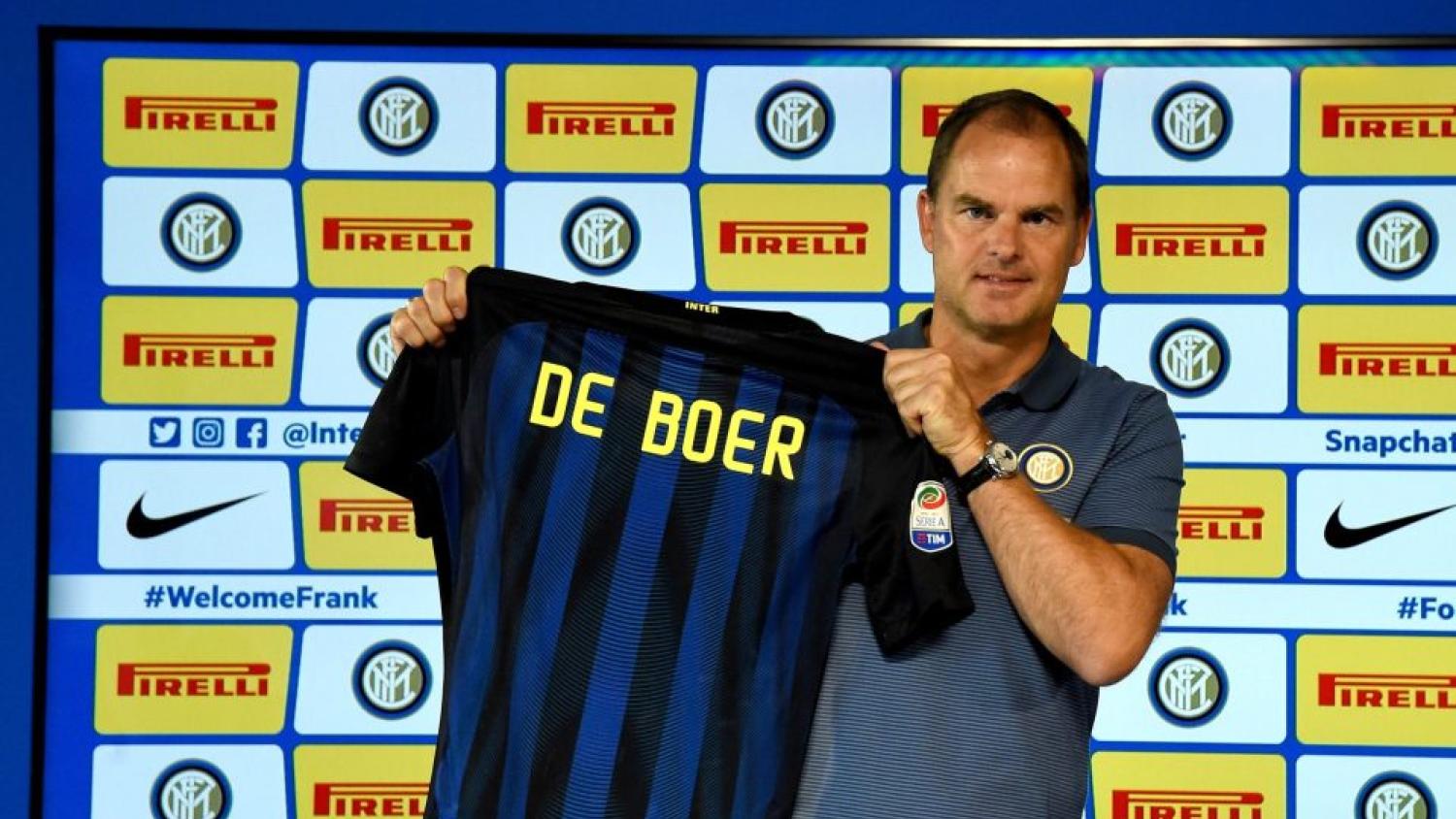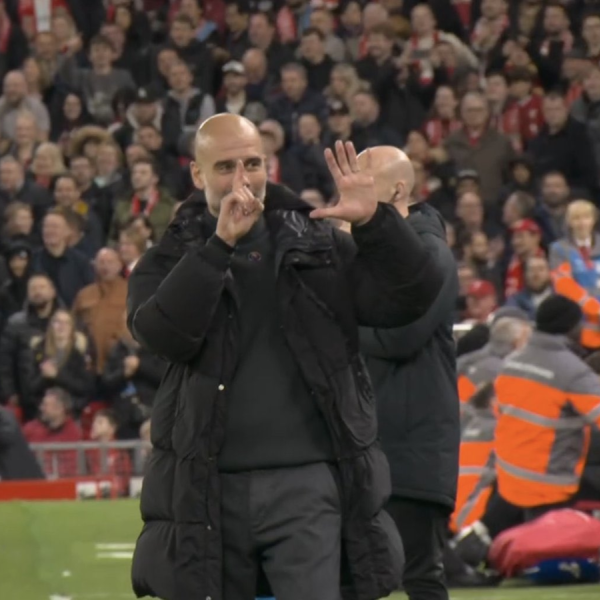Inter sacked Frank de Boer on Tuesday morning. He had been the manager for 85 days, right up until the moment a conference call confirmed that his services would no longer be required.
It is obvious to note that De Boer’s tenure was doomed from the start. Even putting aside the notion that Dutch coaches are somehow the ideological opposite to their Italian counterparts, the way he swept into the club so late in the transfer window was an early indication that everything was not quite right.
Even though some have suggested that De Boer’s time at Ajax was disappointing — that managing the wealthiest side in the Netherlands to a smattering of league titles was par for the course, rather than an exceptional achievement – he did at least seem to be competent. But at Inter, competency takes a backseat to impulse; sanity steps aside in order that a continuous chaos can reign.
Rather than any particular issue pertaining to the manager itself, Frank De Boer was a patsy. He was the latest in a long line of managers to be chewed up and spat out by the hectic, frenzied beast that is Football Club Internazionale Milano. Benítez, Leonardo, Gasperini, Ranieri, Stramaccioni, Mazzarri, Mancini, De Boer. All ushered in with high hopes before being shown the door.
More than ever, it is obvious that the common denominator is the club itself. But what exactly is wrong with Inter?
Crazy Inter. Strangely for a club that built itself on the structural solidity and ruthless organisation of Herrera’s interpretation of catenaccio, Inter has always had a reputation for the daft and the senseless.
In Italy, it’s well known that Inter have all the stability and reliability of a constantly collapsing clown car, the passengers desperately trying to repair the machine as they drive along, each hare-brained scheme only serving to open up new issues elsewhere. We simply don’t have time to list every stupid move ever conducted by the club, so let’s focus on this season alone.
The ownership of Inter has recently changed hands. Since the 1990s, the club had been owned by the Moratti family. The oil tycoons had a reputation for spending big and falling short. They signed Ronaldo and Vieri for record fees but couldn’t win a title. So it was all the way up until the Calciopoli scandal.
As their rivals were relegated and deducted points, Inter became the dominant force in Italian football. After years in charge, Moratti was finally starting to see sustained success. But then the world changed.
It’s a commonly-held theory that the change in Inter ownership came about as the result of the Libyan revolution. Moratti’s African oil interests were primarily based in the conflict-ridden country. He could no longer afford to bankroll a football team.
Step forward Erick Thohir, an Indonesian businessman. He purchased the club from Moratti and then organised the sale, a few years later, to a Chinese consortium. It was this consortium which was finally in place in 2016. Despite such a management upheaval, the club were unable to shed their "crazy" reputation.
The manager at the start of the summer was Roberto Mancini. Mancini was well-remembered by fans as the steady hand on the tiller which had steered the club through the post-calciopoli world, racking up titles as they went along. But his second spell was not as prosperous.
In order to achieve success, Mancini wanted to bring in battle-hardened veterans such as Yaya Toure. The club wanted a different approach, hoping to invest in big-name youth targets. The manager and the management clashed. Mancini departed with two weeks left until the start of the season.
Deciding to follow through on their youth-orientated approach, Inter turned to Frank de Boer. Recently manager of Ajax, a club with a worldwide reputation for molding young talent, they believed that he was the man to forge a new generation of Inter players.
Rather than take the institutional structure of Ajax as an inspiration, Inter simply hired the name above the door. He was signed with twelve days until the curtain opener against Chievo. Having failed to install an entirely new philosophy at the club in a fortnight, few people were shocked. De Boer soldiered on.
But he found himself with problems that was incontrovertibly "Inter" in nature. Two of the club’s marquee signings — Gabriel Barbosa and Joao Mario — were signed for such large fees that the club crossed the threshold for Financial Fair Play spending. As such, the Barbosa and Mario were banned from European competition. As De Boer struggled to make an impact in a relatively easy Europa League group, two of his best players were unavailable due to admin issues.
Even more bizarre, the club’s captain — Argentine striker Mauro Icardi — would fan the flames of controversy when his autobiography (released as he turned 23) lashed out at the club’s most hard-core support.
As the captain and the ultras squabbled, the home crowd cheered as Icardi missed a penalty during another defeat. They held aloft threatening banners, while he claimed he could call upon a group of Argentine gangsters to take the ultras out. The entire issue — now resolved, in a way — might have been dealt with if someone at the club had just read Icardi’s book before it hit the shelves. But they didn’t.
As the club rolled from one crisis to the next, the inevitable happened. They beat the reigning champions. A 2-1 win over Juventus was rightly praised for being a triumph of technical skills, tactics, and determination, a possible hint at the future. Even despite Inter’s struggles, they managed to pull a huge result out of the bag. But the match against Juventus is important for other reasons. Namely, it allows us to draw a comparison between two of Italy’s biggest clubs.
There’s no denying that Juventus are run in a brutally sensible manner. Their transfer dealings, the fact that they own their own purpose-built stadium, their managerial stability, their consistency — in many ways, the contemporary Turin side act as the binary opposite of Inter. Though both teams have first XIs of potentially equal quality, there is a reason Juventus have been champions five years in a row.
There’s a sense that Inter, as a club, have a remarkable chip on their shoulder. As Juventus go from strength to strength, Inter can only watch on with envy. It’s a similar story in their own city. Despite Inter’s success, their fellow San Siro inhibiters AC Milan have always seemed to go one step further.
Milan were first to win the European Cup, pipping Inter by just twelve months. Over the coming decades, the Rossoneri would add league titles and more European trophies, eclipsing Inter as the world famous representatives of Milan.
Even when Inter were the dominant club, there was an insecurity to their dealings, a worry that they were doing the wrong thing. Given that there was an institutional talent for picking exactly the worst thing to do, it’s a justified concern. But such a fear grew to undermine the club. Until Inter focus on their own failings and stop enviously comparing themselves to other clubs, it might well be impossible to impose a stable, successful regime. But they came close, for a while.
It was inevitable that we would get to Jose Mourinho. The Portuguese manager dominates the recent history of Inter like no one else. Responsible for the club’s greatest moment of success — indeed, the possibly the greatest triumph in Italian football — his departure snatched away any prospect of stability.
Mourinho’s approach is well known. He likes to use disciplined, older players. He creates a siege mentality. He rages against the world (the referees, the press, and the rivals) to create a burning desire for success within his tight network of players.
It can lead to incredible devotion and, ultimately, to success. But when he leaves, the house of cards falls apart. When Mourinho left for Real Madrid in 2010, the club’s greatest moment transformed from a fantastic foundation for future success into a desperate struggle to achieve stability.
The slash-and-burn approach to management is never long term. The coaches that followed were all undermined by their failure to live up to Mourinho’s achievements. The aging squad he left behind, the high wages, and the lack of respect for the new managers succeeded in dooming Rafa Benitez and others.
The looming specter of Mourinho soured every success and exacerbated every failure. As Inter collapsed in on themselves, the other Milanese club filled the power vacuum, before they too were brushed aside by the Juventus renaissance.
Which brings us back to Frank de Boer. The Dutchman was not the sickness at Inter, but the symptom. Rather than one man being at fault, the club is failing on an institutional level. Kept afloat by money, media attention, and sheer momentum, the collapsing clown car of Italian football is hurtling along too fast to repair itself in any viable fashion.
The new owners need to take this chance to consolidate their club. The ghost of Mourinho must be exorcized, the constant comparisons to other clubs must halt. Writing off the season and building for the long term might sound defeatist, but a fallow year will allow for greater success in the future.
Right now, Internazionale finally have a chance to repair the rotting structures of the club. With expectations at an all-time low, they can withdraw from the spot light and focus on becoming a better club, top to bottom.
They can do this, but they won’t. Instead, they’ll hire Stefano Pioli and, when he’s sacked in six months, we can just republish this article. The problem with Inter is that they seem incapable of being anything other than themselves, even for a moment. Inter are their own worst enemy.

 Home
Home



